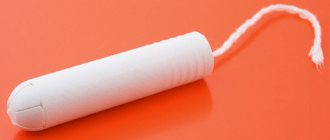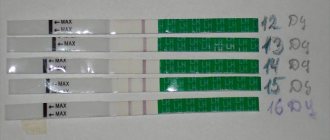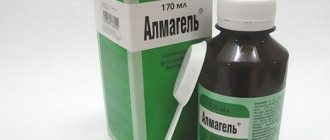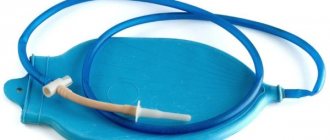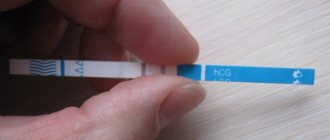Myths about intravaginal hygiene products
There are 2 of the most “creepy” myths about why you should not sleep with a tampon, especially throughout the night.
- It prevents the complete cleansing of the uterus and the flow of menstrual blood. This is the most absurd statement, which is not worthy of a single bit of attention on the part of a woman, and she herself can easily be convinced of this once she has used this hygiene product. Essentially, a tampon is cotton wool, only well compressed. When it is saturated with menstrual blood, it swells, which is why the discharge simply crushes it and flows out. For this reason, you should not sleep with a tampon all night because it risks leaking.
- These intimate hygiene products are a real breeding ground for pathogens. This is partly true, but only if the basic rules of their use are neglected. If the tampon is in the vagina at night for no longer than 8 hours, then there can be no question of any bacterial infection.
Gynecologists also say that the above statements are just stupid myths. Besides, if tampons do not cause discomfort during sleep, why not replace “night” pads with them?
This is much more convenient, and the protection against leakage is much better.
Therefore, if the question arises whether it is possible and safe to sleep with a tampon, then there is nothing to worry about: using this hygiene product at night is possible, and sometimes necessary. The main thing is to choose it correctly.
About starting your period ahead of schedule >>
Pad
A pad is a pad made of a polyethylene base, an absorbent inner layer and an upper permeable layer. It is attached to underwear with an adhesive strip and collects secretions, fitting tightly to the perineum.
The gasket is useful if:
- Heavy periods.
There are times when there is so much discharge that even the most absorbent tampon cannot cope with it. Then you can use the intended pad or duplicate the wicking system using both products. - The tampon causes discomfort.
“Unpleasant sensations” also include psychological discomfort. If finding a foreign object in the vagina seems unpleasant, do not force yourself. - Are you going to sleep?
Unlike tampons, the pad is not inside the body and can be used for longer than 8 hours. For better protection in a supine position, special “night” pads are produced that are large in size. - There is an inflammatory process going on.
Although the pad can become a home for bacteria, it is easily and quickly replaced with a clean one, that is, it does not contribute to the spread and strengthening of the infection.
The disadvantages of the application are not so obvious. The gasket is bad if:
- Afraid of the sight of blood.
Some girls, however, may be bothered by the sight of their own blood on a used pad. Moreover, it will be unpleasant to carry out the necessary manipulations to change it. - There will be no place to change.
The pad should be changed every 3-4 hours and if there is no place during the day where this could be done, it is worth using a longer wearing product. - You smell an unpleasant odor.
The blood on the pad is constantly in contact with air and decomposes, oxidizing. Because of this, there may be a specific odor associated with poor hygiene. - Take care of the environment.
Pads, like any other hygienic material that comes into contact with blood, must be disposed of in a special way, that is, burned at a temperature of 800 C°. Since this does not happen, the gasket, which is partially made of plastic, will take hundreds of years to decompose, polluting the environment.
The absorbency of pads is determined by their thickness and size. The larger these parameters are, the more the gasket absorbs liquids. But it is worth remembering that the large possible volume does not allow you to change the gasket less often. Regardless of how full it is, it must be changed after 3-4 hours.
https://youtu.be/k9Beb57D4K4
How to choose “night” hygiene products?
To avoid pain and discomfort in the vagina, the choice of “night” tampons must be approached with all responsibility. It is necessary to start, first of all, from the amount of discharge.
There are 3 types of tampons - “normal”, “super” and “super plus”.
- Hygienic products from the “normal” category are used for scanty and moderate volumes of menstrual blood secreted. As a rule, they are observed on the 1st, 3rd and 5th day of menstruation. Sleeping with them is very comfortable, since they are practically not felt in the vagina.
- “Super” are used for heavier menstruation (more often on the second day after the start of menstruation). They are also very convenient to use at night.
- “Super Plus” is best used in extreme cases. They are rarely used at night, since at this time of day there is not as much menstrual blood released as during the day. It is better to use a “night” pad or tampons from the “Super” category.
Young girls who are not sexually active are recommended to use “normal” hygiene products. They do not damage the hymen, therefore, they are absolutely safe both day and night.
Rules for using a tampon at night
Proper use of a hygiene product involves following some recommendations:
- The tampon should be inserted immediately before going to bed. In this case, compliance with all hygiene rules described in the instructions is required.
- Tampons of appropriate absorbency and size should be used.
- In the morning, after waking up, you should remove the used tampon. It is advisable to do this no later than eight hours later.
- In case of heavy discharge, it is necessary to additionally use pads that are most suitable in volume.
The choice of such products is made based on your own preferences. You can purchase regular products of the required size, and tampons designed specifically for nighttime.
Features of using “night” tampons
So, girls who still doubt whether it is possible to sleep with a tampon all night should be sure: it is possible, but you need to use them correctly. To do this, you just need to follow these simple rules.
- First of all, you need to choose the right product based on the criteria described above.
- It is necessary to insert the hygiene product into the vagina immediately before going to bed. We should not forget that before this it is necessary to carry out all hygiene procedures.
- You need to change tampons every 4-6 hours, but if that doesn’t work, then being 1 hour late doesn’t pose any threat.
If the menstrual flow is too intense, then “night” pads can be used along with intravaginal hygiene products.
About heavy menstrual bleeding in detail >>
Types of tampons
A little about the product itself. Manufacturers have taken into account all the results of scientific research, so tampons come in different types and are intended for normal – “normal”, heavy – “super” and very heavy – “super plus” bleeding. You should not insert tampons that absorb more than the body needs and prolong the time they remain in the body. The explanation for this is very simple - if the tampon does not have time to become saturated with blood, it can cause discomfort in the vagina due to its dryness. And if you use the product for more than 4-6 hours, you can provoke the development of pathogenic flora.
Virgins should opt for a “mini” or “normal” size so as not to damage the hymen, and if the discharge is very heavy, simply replace it more often.
Tampons for the night should be selected using the same method. Doctors recommend special tampons that stretch in length, not width.
Some manufacturers have developed special overnight tampons that are highly hygroscopic and equipped with small wings for additional protection. This is not a prerequisite, because choosing individual tampons for the night is not at all difficult - women take into account the characteristics of their body and gradually choose the best option.
What products should not be left on overnight?
There are cases when it is better and safer to sleep with a “night” pad. Sometimes it can protect against serious health problems. In this situation we are talking about tampons treated with fragrances or medicinal substances.
Such hygiene products can only be used during the day; they should absolutely not be left overnight.
The fact is that substances contained in tampon wool or viscose, with prolonged contact with menstrual blood and vaginal epithelium, can cause severe irritation and allergic reactions. As a result, a woman, in addition to discomfort in the genital area, also suffers from serious health problems, so you should think carefully before deciding to use such hygiene products.
Critical days: the whole truth about sex, intimate hygiene and tampons
Why do they write about toxic shock syndrome in the instructions for tampons?
The risk of its occurrence is only one case in 100,000, which is 300 times less than the risk of developing cancer. But the producers consider it a point of honor to warn you. When super-absorbent tampons were introduced in the late 1970s, the incidence of TSS in women who used them suddenly increased. Perhaps the problem was with the synthetic material. Or maybe it was that the girls left the product in for too long. Scientists still haven't figured out the connection between tampon use and toxic shock syndrome. But at the request of the American Food and Drug Administration, manufacturers added a mention of risks to the instructions, and began to indicate the absorption index on the boxes.
Tampons contain cellulose, cotton and some synthetics, whose properties are similar to medical cotton wool. It's hygienic.
The same droplets also appeared on the packaging of sanitary pads: theoretically, they can also become a breeding ground for Staphylococcus aureus. The bacterium is transmitted through household contact or is present in the body in small quantities, and under exceptional conditions it can multiply and poison the body with toxins. And, by the way, this happens not only to women, but even to men and children.
Do tampons affect the natural vaginal environment?
No, and this was proven by the results of at least 15 studies conducted at different times by different groups of scientists. And doctors of medical sciences H. Spitzbarth from Austria and V. Unzeitig from the Czech Republic even found that the number of beneficial bacteria in the vagina when using tampons is slightly greater than when using pads, and the number of E. coli is lower. To be fair, the internal environment of the vagina does change during your period. Lactobacilli may “lose ground” a little, but this feature is not associated with external factors. A study conducted by a team of doctors (including representatives from Harvard Medical School) showed that the number of aerobic and anaerobic bacteria in a tampon left inside for two hours was even slightly less than in a smear taken from the same woman. In other words, a piece of cotton wool with a string does not play the unenviable role of a breeding ground for infections and does not create an imbalance in initially healthy girls.
During the first days of your period, change your tampon every 4 hours. Some of them can withstand light bleeding for up to 8 hours.
Is it possible to leave a tampon inside for a long time?
Yes, if it is designed for long-term use. Look for the marking on the packaging in the form of 5 drops - this level of absorption will provide up to eight hours without leakage. The exact time, of course, depends on individual characteristics: many girls can safely leave a tampon overnight from the first days of menstruation.
We anticipate your question: isn’t it harmful? It is not harmful, because even in this case the tampon remains “invisible” to the internal environment. Professor of the already mentioned Harvard Medical School Andrew Bruce Onderdonk studied a number of feminine hygiene products, and this is what he found out. If you leave a tampon inside even for 12 hours, the population of opportunistic bacteria in it will actually increase, although only slightly. But tests show that the same thing will happen in the microflora of the vagina, which did not come into contact with the tampon. What does it mean? And the fact is that the normal process of preponderance from “beneficial” bacteria in favor of their rivals occurs regardless of the product you use during menstruation.
Does the risk of contracting an STD increase during your period?
Of course, during menstruation there is a higher probability of contracting various infectious diseases, since the blood is an excellent environment for the development of pathogenic bacteria, and there is also a risk of inflammation of the inner mucous membrane of the uterus, since during menstruation the cervix is open and bacteria will have no difficulty get from the vagina into the uterus. Therefore, if during this period you want to indulge in love pleasures, in no case should you forget about using contraceptives.
There is an opinion that you cannot get pregnant during menstruation, but this is a misconception. The most favorable period for conception is ovulation. Ovulation usually occurs in the middle of the cycle, but for some women it can be delayed by 6-8 days. Sometimes two ovulations occur in one cycle. Therefore, we should not forget that sperm in the female body can retain their viability for five days, and, as we wrote earlier, we should not neglect condoms.
Popular
- Give birth and it will pass: how and why women are refused treatment
Fascinating... It would be interesting to read more, send it by email.
Thank you.
We have sent a confirmation email to your email.
What could be the consequences?
Women who have not previously used intravaginal hygiene products should first make sure that they do not have hypersensitivity to the material from which they are made. To do this, you need to insert a tampon into the vagina for 1-2 hours during the day. If there is no illness or discomfort, it can be used at night.
If these intimate hygiene products are used incorrectly, severe intoxication of the body may develop, accompanied by:
- chills;
- nausea;
- vomiting;
- cephalgia;
- dizziness;
- pyretic fever.
The woman experiences convulsions throughout her body, and there is a sharp and significant drop in blood pressure. It’s hard to imagine, but the cause of these dangerous symptoms can be ordinary intravaginal hygiene products. Based on the possible risks, the only correct conclusion can be drawn: tampons can be used at night, but for this the woman must be completely convinced of their safety for her health.
How to insert a tampon?
First you need to decide in what position it is more convenient to insert it. The tampon should be carefully pushed in, feeling in which direction it goes as easily as possible.
You should carefully insert it with your finger, pushing it into the vagina, first upward and then diagonally to the back. There is no need to worry that the tampon will be inserted in the wrong place, since the opening of the urinary tract is too small for it to fit there.
During insertion into the vagina, you need to ensure that the thread remains outside.
If the tampon is inserted correctly, you will not feel it, since it is in an area where there are few sensory nerves. The product will not fall out when changing body position, serious physical activity and movement during the day.
Chinese tampons
Let's look at the instructions and reviews for Chinese tampons. These are phytotampons that have a natural composition. They are created to maintain the health of the female genital organs, are effective and easy to use.
The sequence of actions when using medicinal tampons in accordance with the instructions:
- carry out hygiene procedures for intimate organs, disinfect hands;
- check the integrity of the packaging;
- open the package;
- straighten the thread at the base of the product;
- slowly insert the tampon to a depth of no more than five to seven centimeters;
- leave the remedy in the vagina for three days;
- to remove the grass ball, you need to slowly pull the thread;
- After extraction, do a douche or vaginal bath with chamomile infusion or other anti-inflammatory herbal remedy.
You can insert the next tampon in a day. There is a generalized scheme of use: three days with the drug - douching - one day break - douching again - another tampon (and other tampons in accordance with the generalized scheme and prescribed therapy, with the exception of critical days).
The use of such tampons in gynecology is prohibited during menstruation.
Some women admire this remedy, calling it almost a panacea for female diseases, others are skeptical about their use. If you read the negative reviews in more detail, you will see that they are almost always talking about individual sensitivity, or the likely purchase of counterfeit tampons, or a simple failure to follow the instructions for use.
Doctors' opinions also vary. Some consider Chinese tampons to be quackery that is not a medicine, while others successfully use the product in their practice.
We found out whether it is possible to sleep with a tampon.
